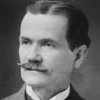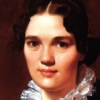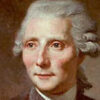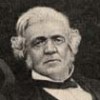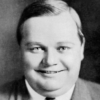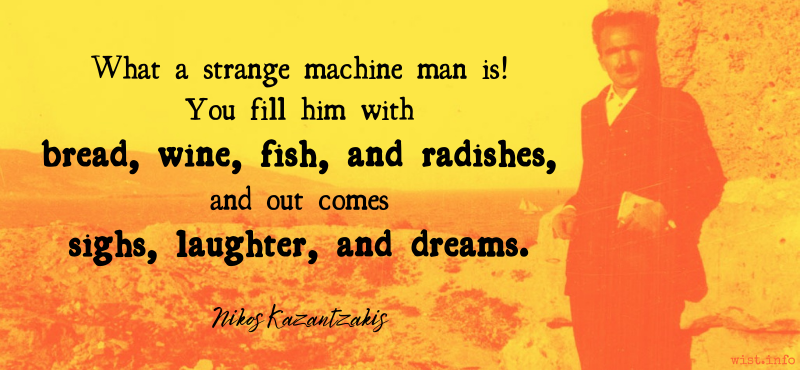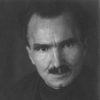But ne’ertheless I hope it is no crime
To laugh at all things — for I wish to know
What, after all, are all things — but a show?
Quotations about:
laughter
Note not all quotations have been tagged, so Search may find additional quotes on this topic.
I still should not want you to smile on all occasions:
for nothing is more silly than a silly smile.[Tamen renidere usque quaque te nollem;
Nam risu inepto res ineptior nulla est.]Catullus (c. 84 BC – c. 54 BC) Latin poet [Gaius Valerius Catullus]
Carmina # 39 “To Egnatius,” ll. 15-16 [tr. McDonnell (1998)]
(Source)
(Source (Latin)). Alternate translations:
E'en then that ceaseless ill-tim'd grin forego:
A silly laugh's the silliest thing I know.
[tr. Nott (1795), # 37]
I'd say renounce thy ceaseless idiot grin,
A silly laugh is folly, if not sin.
[tr. Cranstoun (1867)]
Yet sweetly smiling ever I would have you not,
For silly laughter, it's a silly thing indeed.
[tr. Ellis (1871)]
Yet thy incessant grin I would not see,
For naught than laughter silly sillier be.
[tr. Burton (1893)]
Still I wish you wouldn't grin forever everywhere; for nothing is more senseless than senseless giggling.
[tr. Smithers (1894)]
Still I should not like you to be smiling everlastingly; for there is nothing more silly than a silly laugh.
[tr. Warre Cornish (1904)]
I would have you drop your endless grin: for nothing is more inane than inane laughter.
[tr. Stuttaford (1912)]
Still not to smile for aye is wisdom's rule:
For folly's laugh proclaims the peerless fool.
[tr. MacNaghten (1925)]
I still should still disapprove that constant smile;
It shows a silly, poor, affected style.
[tr. Wright (1926)]
Your smile would still offend me; nothing is worse
than senseless laughter from a foolish face.
[tr. Gregory (1931)]
I still wouldn't want to see you always grinning,
for nothing is more inept than inept laughter.
[tr. C. Martin (1979)]
I’d still not want you to smile all the time:
there’s nothing more foolish than foolishly smiling.
[tr. Kline (2001)]
I'd still not want you flashing yours all round since
nothing's more fatuous than a fatuous grin.
[tr. Green (2005)]
I still should not want you to smile on all occasions:
for nothing is more silly than a silly smile.
[tr. Wikisource (2018)]
But the power
of a man’s will is often powerless:
laughter and tears follow so close upon
the passions that provoke them that the more
sincere the man, the less they obey his will.
[Ma non può tutto la virtù che vuole;
ché riso e pianto son tanto seguaci
a la passion di che ciascun si spicca,
che men seguon voler ne’ più veraci.]Dante Alighieri (1265-1321) Italian poet
The Divine Comedy [Divina Commedia], Book 2 “Purgatorio,” Canto 21, l. 105ff (21.105-108) (1314) [tr. Musa (1981)]
(Source)
(Source (Italian)). Alternate translations:
As each alternate Passion leaves a trace
On the still-varying muscles of the face,
Fictitious oft; but, by the candid mind,
Conceal'd with pain, the dawn of dubious joy
My features wore.
[tr. Boyd (1802), st. 20]
But the power which wills,
Bears not supreme control: laughter and tears
Follow so closely on the passion prompts them,
They wait not for the motions of the will
In natures most sincere.
[tr. Cary (1814)]
But will is not with power entire endued.
Laughter and tears pursue so much the trace
The passion dictates that imprints them there,
Nor follow will in natures most sincere.
[tr. Bannerman (1850)]
But yet the power that wills cannot do all things;
For tears and laughter are such pursuivants
Unto the passion from which each springs forth,
In the most truthful least the will they follow.
[tr. Longfellow (1867)]
But virtue cannot all it would; for laughter and tears follow so much the passion from which each springs, that they least obey will in the most truthful men.
[tr. Butler (1885)]
But all it wishes, will cannot forbear:
For smiles and tears to diverse passion wed,
Upon that passion follow so instinct.
In open natures, will is quite outsped.
[tr. Minchin (1885)]
But the power that wills cannot do everything; for smiles and tears are such followers on the emotion from which each springs, that in the most truthful they least follow the will.
[tr. Norton (1892)]
But the virtue which wills is not all powerful;
for laughter and tears follow so closely the passion from which each springs, that they least obey the will in the most truthful.
[tr. Okey (1901)]
But the power to will cannot do all, for laughter and tears are so close followers on the passions from which they spring that they least follow the will in the most truthful.
[tr. Sinclair (1939)]
But all is not done by the will's decree;
For on the passion wherefrom each is bred
Laughter and tears follow so close that least
In the most truthful is the will obeyed.
[tr. Binyon (1943)]
But will with us is not made one with power;
Tears, laughter, tread so hard upon the heel
Of their evoking passions, that in those
Who're most sincere they least obey the will.
[tr. Sayers (1955)]
But man's will
is not supreme in every circumstance:
for tears and laughter come so close behind
the passions they arise from, that they least
obey the will of the most honest mind.
[tr. Ciardi (1961)]
But the power that wills cannot do everything; for smiles and tears are such close followers on the emotion from which each springs, that in the most truthful they least follow the will.
[tr. Singleton (1973)]
But virtue cannot do everything that it will;
For laughter and tears follow so closely on
The passions from which they respectively proceed,
That they follow the will least in the most truthful.
[tr. Sisson (1981)]
And yet the power of the will cannot do all,
for tears and smiles are both so faithful to
the feelings that have prompted them that true
feeling escapes the will that would subdue.
[tr. Mandelbaum (1982)]
But the power of the will cannot do everything,
for laughter and weeping follow so closely on the passion from which each springs that they follow the will least in those who are most truthful.
[tr. Durling (2003)]
But the virtue that wills is not all-powerful, since laughter and tears follow the passion, from which they spring, so closely, that, in the most truthful, they obey the will least.
[tr. Kline (2002)]
But will power can't do everything it wills.
For tears and laughter follow on so close
to those emotions from which each act springs
that these least follow will in those most true.
[tr. Kirkpatrick (2007)]
But the power that wills cannot do all it wills,
for laughter and tears so closely follow feelings
from which they spring, they least can be controlled
in those who are most truthful.
[tr. Hollander/Hollander (2007)]
But will alone won't stop a human being,
Since laughter and tears are deeply interwoven,
Following hard on emotions which spring them forth,
And when they're truthful have little to do with the will.
[tr. Raffel (2010)]
What have you to say against laughing? Cannot one be very serious even whilst laughing? Dear Major, laughter keeps us more rational than vexation.
[Was haben Sie denn gegen das Lachen? Kann man denn auch nicht lachend sehr ernsthast sein? Lieber Major, das Lachen erhält uns vernünftiger als der Verdruss.]
Gotthold Lessing (1729-1781) German playwright, philosopher, dramaturg, writer
Minna von Barnhelm, Act 4, sc. 6 [Minna] (1763) [tr. Holroyd/Bell (1888)]
(Source)
(Source (German)). Alternate translation:
What have you to say against laughing? Can we not while laughing be very serious? Laughing keeps us more rational than sadness caused by vexation.
[Source (1884)]
The fear of being laughed at makes cowards of us all.
Mignon McLaughlin (1913-1983) American journalist and author
The Neurotic’s Notebook, ch. 10 (1963)
(Source)
Maturity is a bitter disappointment for which no remedy exists, unless laughter can be said to remedy anything.
Kurt Vonnegut, Jr. (1922-2007) American novelist, journalist
Cat’s Cradle, ch. 88 [Bokonon] (1963)
(Source)
Perhaps I know best why man alone laughs: he alone suffers so deeply that he had to invent laughter.
[Vielleicht weiss ich am besten, warum der Mensch allein lacht: er allein leidet so tief, dass er das Lachen erfinden musste.]
Friedrich Nietzsche (1844-1900) German philosopher and poet
The Will to Power [Der Wille zur Macht], Book 1, Part 2, ch. 2/b, § 91 (1901) [ed. Elisabeth Förster-Nietzsche] [tr. Kaufmann/Hollingdale (1967)]
(Source)
(Source (German)). Alternate translations:
Perhaps I know best why man is the only animal that laughs : he alone suffers so excruciatingly that he was compelled to invent laughter.
[tr. Ludovici (1910)]
Perhaps I know best why it is man alone who laughs; he alone suffers so deeply that he had to invent laughter.
[Common, e.g.]
Perhaps I know best why man alone laughs: only he suffers so profoundly that he was bound to invent laughter.
[tr. Hill/Scarpitti (2017)]
What is the reason that we laugh so freely in a theatre but are ashamed to weep? Is it less natural to be melted by what excites pity than to burst into laughter at what is comical? […] It is not thought odd to hear a whole theatre ring with laughter at some passage of a comedy, but, on the contrary, it implies that it was funny, and very naturally performed; therefore the extreme restraint every one puts on himself not to shed tears and the affected laughter with which one tries to disguise them, clearly prove that the natural result of lofty tragedy should be to make us all weep without concealment and publicly, and without any other hindrance than wiping our eyes.
[D’où vient que l’on rit si librement au théâtre, et que l’on a honte d’y pleurer? Est-il moins dans la nature de s’attendrir sur le pitoyable que d’éclater sur le ridicule? […] Comme donc ce n’est point une chose bizarre d’entendre s’élever de tout un amphithéâtre un ris universel sur quelque endroit d’une comédie, et que cela suppose au contraire qu’il est plaisant et très naïvement exécuté, aussi l’extrême violence que chacun se fait à contraindre ses larmes, et le mauvais ris dont on veut les couvrir prouvent clairement que l’effet naturel du grand tragique serait de pleurer tous franchement et de concert à la vue l’un de l’autre, et sans autre embarras que d’essuyer ses larmes, outre qu’après être convenu de s’y abandonner.]
Jean de La Bruyère (1645-1696) French essayist, moralist
The Characters [Les Caractères], ch. 1 “Of Works of the Mind [Des Ouvrages de l’Esprit],” § 50 (1.50) (1688) [tr. Van Laun (1885)]
(Source)
(Source (French)). Alternate translations:
What's the reason that we laugh so freely, and are asham'd to weep at the Theatre? Is Nature less subjects to be soften'd by pity, than to burst forth at what is Comical? [...] We must suppose 'tis the natural effect of a good Tragedy, to make us Weep freely in sight of the whole Audience, without any other trouble than drying our Eyes, and wiping our Faces. It being no more ridiculous to be seen Weeping, than to be heard to Laugh by the whole Theatre: On the contrary, we then conclude there was something acted very pleasantly, and to the life; and the restraint a man puts on him∣self to hide his tears, by an affected Grimace, plainly demonstrates that he ought not to resist the main design of a Tragedy, but give way to his Passions, and discover em as openly, and with as much confidence, as at a Comedy.
[Bullord ed. (1696)]
What is the reason we laugh so freely, but are asham'd to weep at the Theatre? Is Nature less subject to be soften'd by Pity, than to burst out into Laughter at what is Comical? [...] As therefore 'tis thought no odd thing to hear the whole Amphitheatre ring with an Universal Laughter, at some passage of a Comedy; butr on the contrary, implies something was pleasantly said, and naturally perform';d; so the extreme violence which every one offers to himself in constraining his Tears, and disguising ;em with affected Grimaces, clealry prove that the Natural Effect of good Tragedy is to make us weep with all freedom, and in concert, in another's sight, and wihtout any other disturbance than wiping our Eyes.
[Curll ed. (1713)]
Why is it that we laugh so freely at the theatre and yet are ashamed to weep there? Is it less natural to be moved by what is pitiful than to be amused by what is ridiculous? [...] Since then it is no unusual thing to hear a whole theatre break into unanimous laughter at some passage in a comedy, since this implies, on the contrary, that it is amusing and extremely life-like, so the extreme violence we do to our feelings by restraining our tears, and the false laughter with which we try to conceal them, clearly proves that the natural effect of great tragedy should be to make us all weep quite openly, with one accord, in one another’s presence, with no further concern than to wipe our eyes.
[tr. Stewart (1970), "Of Books"]
Laugh at your Friends, and if your Friends are sore;
So much the better, you may laugh the more.Alexander Pope (1688-1744) English poet
Epilogue to the Satires, Dialogue 1, ll. 55-56 (1738)
(Source)
I’ve always felt sorry for people afraid of feeling, of sentimentality, of emotion, who conceal what they feel and are unable to weep with their whole heart. Because those who do not know how to weep with their whole heart don’t know how to laugh either.
Golda Meir (1898-1978) Russian-American-Israeli politician, teacher; Prime Minister of Israel (1969-1974)
Interview by Oriana Fallaci, Ms. (1973-04)
(Source)
The Ms. article is a portion of an interview held in Jerusalem in November 1972. Answering to the charge that she is hard and inflexible, countering that she is very sensitive and feeling in most matters.
The full interview was reprinted in Fallaci, Interview with History, ch. 4 "Golda Meir" (1974) [tr. Shepley (1976)], but slightly rephrased:
I’ve always felt sorry for people who are afraid of their feelings, of their emotions, and who hide what they feel and can’t cry wholeheartedly. Because anyone who can’t cry wholeheartedly can’t laugh wholeheartedly either.
Was this re-edited (and in which instance?), or is it a matter of different translation? It's unclear in what language the interview was conducted, but the original edition of the book (Intervista con la Storia) was in Italian, Fallaci's native language, which gave the passage as follow:
A me ha sempre fatto pena la gente che ha paura dei sentimenti, delle emozioni, e nasconde quello che prova e non sa piangere con tutto il cuore. Perché chi non sa piangere con tutto il cuore non sa nemmeno ridere a gola spiegata.
Laughter is poison to fear.
George R. R. Martin (b. 1948) American author and screenwriter [George Raymond Richard Martin]
A Game of Thrones, “Catelyn” 8 [Catelyn Stark] (1996)
(Source)
You have to laugh at the things that hurt you just to keep yourself in balance, just to keep the world from running you plumb crazy.
Ken Kesey (1935-2001) American novelist, essayist, countercultural figure
One Flew Over the Cuckoo’s Nest, Part 3 (1962)
(Source)
To laugh sturdily and often, and to wear a long belt, are not incongruous with sanctity. God’s image is in every man, high or low — a road puddle holds the moon as well as the sea.
Austin O'Malley (1858-1932) American ophthalmologist, professor of literature, aphorist
Keystones of Thought (1914)
(Source)
I have known sorrow — therefore I
May laugh with you, O friend, more merrily
Than those who never sorrowed upon earth
And know not laughter’s worth.I have known laughter — therefore I
May sorrow with you far more tenderly
Than those who never guess how sad a thing
Seems merriment to one heart’s suffering.Theodosia Pickering Garrison (1874-1944) American poet
“Knowledge,” The Century Magazine (1900-08)
(Source)
It’s no use crying over spilt evils. It’s better to mop them up laughing.
Eleanor Farjeon (1881-1965) English author
Gypsy and Ginger, “Gypsy and Ginger Take Things Seriously” [Gypsy] (1920)
(Source)
Some people laughed to see the alteration in him, but he let them laugh, and little heeded them; for he was wise enough to know that nothing ever happened on this globe, for good, at which some people did not have their fill of laughter in the outset; and knowing that such as these would be blind anyway, he thought it quite as well that they should wrinkle up their eyes in grins, as have the malady in less attractive forms. His own heart laughed: and that was quite enough for him.
Charles Dickens (1812-1870) English writer and social critic
A Christmas Carol, Stave 5 “The End of It” (1843)
(Source)
I’m struck by how laughter connects you with people. It’s almost impossible to maintain any kind of distance or any sense of social hierarchy when you’re just howling with laughter. Laughter is a force for democracy.
No man who has once heartily and wholly laughed can be altogether irreclaimably bad.
Thomas Carlyle (1795-1881) Scottish essayist and historian
Sartor Resartus, Book 1, ch. 4 (1831)
(Source)
LAUGHTER, n. An interior convulsion, producing a distortion of the features and accompanied by inarticulate noises. It is infectious and, though intermittent, incurable. Liability to attacks of laughter is one of the characteristics distinguishing man from the animals — these being not only inaccessible to the provocation of his example, but impregnable to the microbes having original jurisdiction in bestowal of the disease. Whether laughter could be imparted to animals by inoculation from the human patient is a question that has not been answered by experimentation. Dr. Meir Witchell holds that the infection character of laughter is due to the instantaneous fermentation of sputa diffused in a spray. From this peculiarity he names the disorder Convulsio spargens.
Ambrose Bierce (1842-1914?) American writer and journalist
“Laughter,” The Cynic’s Word Book (1906)
(Source)
Included in The Devil's Dictionary (1911). Originally published in the "Devil's Dictionary" column in the San Francisco Wasp (1886-05-01).
I hasten to laugh at everything, lest I should have to weep at everything.
[Je me presse de rire de tout, de peur d’être obligé d’en pleurer.]
Pierre Beaumarchais (1732-1799) French playwright, polymath [Pierre-Augustin Caron de Beaumarchais]
The Barber of Seville [Le Barbier de Séville], Act 1, sc. 2 [Figaro] (1773) [tr. 1896]
(Source)
(Source (French)). Alternate translations:
I make haste to laugh at everything for fear of being obliged to weep.
[Motto for the London Figaro (1871)]
I am eager to laugh at all for fear of being obliged to weep.
[Source (1887)]
I hasten to laugh at everything for fear that otherwise I might be forced to weep over it.
[tr. Taylor (1922)]
I force myself to laugh at everything for fear of being forced to weep at it.
[tr. Bermel (1960)]
I forced myself to laugh at everything for fear of having to weep.
[tr. Wood (1964)]
I always hasten to laugh at everything for fear that I may be obliged to weep.
[tr. Luciani (1964)]]
I make a point of laughing at everything, for fear of having to cry.
[tr. Anderson (1993)]
I make a point of laughing at life, because otherwise I'm afraid it would make me weep.
[tr. Coward (2003)]
I quickly laugh at everything, for fear of having to cry.
[Bartlett's]
And endless other variations ("I force myself to laugh at everything, for fear of having to cry") in one-off passages.
Sometimes given, in French, as "Je me hâte de me moquer de tout, de peur d'être obligé d'en pleurer."
Compare to Byron (1820).
Not living in fear is a great gift, because certainly these days we do it so much. And do you know what I like about comedy? You can’t laugh and be afraid at the same time — of anything. If you’re laughing, I defy you to be afraid.
Unless a thing is dignified, it cannot be undignified. Why is it funny that a man should sit down suddenly in the street? There is only one possible or intelligent reason: that man is the image of God. It is not funny that anything else should fall down; only that a man should fall down. No one sees anything funny in a tree falling down. No one sees a delicate absurdity in a stone falling down. No man stops in the road and roars with laughter at the sight of the snow coming down. The fall of thunderbolts is treated with some gravity. The fall of roofs and high buildings is taken seriously. It is only when a man tumbles down that we laugh. Why do we laugh? Because it is a grave religious matter: it is the Fall of Man. Only man can be absurd: for only man can be dignified.
Gilbert Keith Chesterton (1874-1936) English journalist and writer
“Spiritualism,” All Things Considered (1908)
(Source)
We should laugh before being happy, for fear of dying without having laughed.
[Il faut rire avant que d’être heureux, de peur de mourir sans avoir ri.]
Jean de La Bruyère (1645-1696) French essayist, moralist
The Characters [Les Caractères], ch. 4 “Of the Heart [Du Coeur],” § 63 (4.63) (1688) [tr. Stewart (1970)]
(Source)
(Source (French)). Alternate translations:
We must laugh before we are happy, or else we may die before we have cause to laugh.
[Bullord ed. (1696)]
We must laugh before we are happy, for fear we die before we laugh at all.
[Curll ed. (1713)]
We must laugh before we are happy, or else we may die before we ever laugh at all.
[Browne ed. (1752)]
We must laugh before we are happy, or else we may die before ever having laughed at all.
[tr. Van Laun (1885)]
We must laugh before we are happy, for fear of dying before we have laughed.
[tr. Lee (1903), "Brief Reflections on Men and Things"]
One half of the world laughs at the other, and fools are they all.
[La mitad del mundo se está riendo de la otra mitad, con necedad de todos.]
Baltasar Gracián y Morales (1601-1658) Spanish Jesuit priest, writer, philosopher
The Art of Worldly Wisdom [Oráculo Manual y Arte de Prudencia], § 101 (1647) [tr. Jacobs (1892)]
(Source)
(Source (Spanish)). Alternate translations:
One part of the world laughs at the other, and both laugh at their common folly.
[Flescher ed. (1685)]
Half the world laughs at the other half, even though the lot are fools.
[tr. Fischer (1937)]
Half the world is laughing at the other half, and folly rules over all.
[tr. Maurer (1992)]
Nor ought you ever to laugh at any joke or smart saying of your own; for you will be thought to applaud your own wit. It belongs to the company, and not to him who says a good thing, to express their approbation by a laugh.
[Né de’ tuoi medesimi motti voglio che tu ti rida, che è un lodarti da te stesso: egli tocca di ridere a chi ode, e non a chi dice.]
Giovanni della Casa (1503-1556) Florentine poet, author, diplomat, bishop
Galateo: Or, A Treatise on Politeness and Delicacy of Manners [Il Galateo overo de’ costumi], ch. 30 (1558) [tr. Graves (1774)]
(Source)
(Source (Italian)). Alternate translations:
But a man must beware he doe not laughe at his owne gestes, and his doings. For that makes men weene hee woulde faine praise him selfe. It is for other men to laughe that heare, and not for him that telles the tale.
[tr. Peterson (1576)]
And I do not want you to laugh at your own jokes, for it is a type of self-praise. It is the hearer who should laugh, not the speaker.
[tr. Eisenbichler/Bartlett (1986)]
The question of laughter lies with the hearer, not with the narrator.
[Source]
A good laugh overcomes more difficulties and dissipates more dark clouds than any other one thing.
Laura Ingalls Wilder (1867-1957) American writer
“‘Thoughts are Things,'” Missouri Ruralist (5 Nov 1917)
(Source)
Reprinted in Stephen Hines, ed., Laura Ingalls Wilder - Farm Journalist (2007).
A good laugh is sunshine in a house.
William Makepeace Thackeray (1811-1863) English novelist
“On Love, Marriage, Men, and Women,” Sketches and Travels in London (1856)
(Source)
This particular line is widely attributed to Thackeray, but rarely cited. Part of the problem is that it is almost always given as "A good laugh is sunshine in the house," rather than "a house."
It is also sometimes cited to his famous novel Vanity Fair (1848), though the quotation cannot be found there.
We cannot really love anybody with whom we never laugh.
Agnes Repplier (1855-1950) American writer
“Goodness and Gayety,” Americans and Others (1912)
(Source)
Note: Though this is usually attributed to Repplier, she precedes the phrase with "It has been wisely said that ..."
Laughter is carbonated holiness.
Anne Lamott (b. 1954) American novelist and non-fiction writer
Plan B, ch. 5 “Holy of Holies 101” (2004)
(Source)
Laughter is a tranquilizer with no side effects.
Arnold H. Glasow (1905-1998) American publisher, humorist, aphorist
(Attributed (1974))
More discussion of this quotation: The Big Apple: “Laughter is a tranquilizer with no side effects”.
For me, a hearty “belly laugh” is one of the most beautiful sounds in the world.
Bennett Cerf (1898-1971) American publisher, humorist
An Encyclopedia of Modern American Humor, Foreword (1954)
(Source)
Variant: "For me, one of the most beautiful sounds in the world is a hearty laugh."
Life is a hard battle anyway. If we laugh and sing a little as we fight the good fight of freedom, it makes it all go easier.
Sojourner Truth (1797-1883) American abolitionist, women's rights activist [b. Isabella Baumfree]
Quoted in Elizabeth Cady Stanton, Letter to the Editor, New York World (13 May 1867)
(Source)
Recorded in Stanton, Anthony, Gage, History of Woman Suffrage, Vol. 2 "1861-76", Appendix to Chapter 18 (1881).
This quote is often given with the following sentence appended to it:
I will not allow my life's light to be determined by the darkness around me.
However this is not in the original, and I have been unable to source it.
Learn what is to be taken seriously and laugh at the rest.
Herman Hesse (1877-1962) German-born Swiss poet, novelist, painter
Steppenwolf (1927) [tr. Creighton, rev. Milleck (1963)]
(Source)
I don’t believe there is any finer mission on earth than just to make people laugh.
Roscoe "Fatty" Arbuckle (1887-1933) American silent film actor, comedian, director, screenwriter
“Fatty Off Guard,” interview by Elizabeth Sears (1916)
(Source)
Without laughter life on our planet would be intolerable. So important is laughter to us that humanity highly rewards members of one of the most unusual professions on earth, those who make a living by inducing laughter in others. This is very strange if you stop to think of it: that otherwise sane and responsible citizens should devote their professional energies to causing others to make sharp, explosive, barking-like exhalations.
Steve Allen (1922-2000) American composer, entertainer, and wit.
Funny People, Introduction (1981)
(Source)
Humor is the most honest of emotions. Applause for a speech can be insincere, but with humor, if the audience doesn’t like it there’s no faking it.
Robert Orben (b. 1927) American comedy writer, magician, speechwriter
In “A Little Night Humor,” Washington Post (28 Jan 1982)
(Source)
There are three things which are real: God, human folly, and laughter. Since the first two pass our comprehension, we must do what we can with the third.
Aubrey Menen (1912-1989) British writer, novelist, satirist, theatre critic
Rama Retold, Book 3, ch. 7 [Valmiki] (1954)
(Source)
This book is a modern retelling of part of the Ramayana.
A variant of this was inscribed on a silver beer mug given on a gift that President John F Kennedy gave to David Powers:
There are three things which are real:
God, human folly and laughter.
The first two are beyond our comprehension
So we must do what we can with the third.
Everything is funnier in retrospect, funnier and prettier and cooler. You can laugh at anything from far enough away.
Chuck Palahniuk (b. 1962) American novelist and freelance journalist
Stranger Than Fiction: True Stories, “Consolation Prizes” (2004)
(Source)
I love people who make me laugh. I honestly think it’s the thing I like most, to laugh. It cures a multitude of ills. It’s probably the most important thing in a person.
Audrey Hepburn (1929-1993) Belgian-English actress
“Hepburn Heart,” Interview with Dominick Dunne, Vanity Fair (May 1991)
(Source)
I really love language; it allows us to explain the pain and the glory, the nuances and the delicacies, of our existence. Most of all, it allows us to laugh. We need language.
Laugh if you are wise, O girl, laugh.
[Ride, si sapis, o puella, ride.]
Martial (AD c.39-c.103) Spanish Roman poet, satirist, epigrammatist [Marcus Valerius Martialis]
Epigrams [Epigrammata], Book 2, epigram 41 (2.41.1) (AD 86) [tr. Ker (1919)]
(Source)
"To Maximina." (Source (Latin)).
Martial says he thinks he's quoting Ovid, but it aligns with nothing known or still extant from that poet. As the phrase is hendecasyllabic, and Ovid is not known to have published anything in that meter, it is at the very least believed a paraphrase. It is still usually credited as a fragment for Ovid. It's ironic, since it is the point of this Martial epigram, that in Ars Amatoria 3.279ff, Ovid warns against laughing if one's teeth are bad; see Williams for more discussion.
Alternate translations:
Laugh, my girl, laugh, if you bee wise.
[16th C Manuscript]
Laugh, lovely maid, laugh oft, if thou art wise.
[tr. Killigrew (1695)]
Laugh, my pretty damsel, laugh;
If thou'rt cunning, but by half.
[tr. Elphinston (1782), Book 6, Part 3, ep. 8]
Smile, O damsel, if you are wise, smile.
[tr. Amos (1858), ch. 3, ep. 101]
Laugh if thou art wise, girl, laugh.
[tr. Bohn's Classical (1859)]
Laugh if you are wise, girl, laugh
[tr. Bohn's Classical (1871)]
Laugh, if thou be wise.
[ed. Harbottle (1897)]
Laugh, maiden, laugh, if thou be wise.
[tr. Pott & Wright (1921)]
Smile, maiden, smile.
[tr. Francis & Tatum (1924), ep. 86]
Laugh, girl, laugh if you're sensible.
[tr. Bovie (1970)]
Laugh if you have any sense, girl, laugh.
[tr. Shackleton Bailey (1993)]
Laugh, girl; if you're clever, laugh!
[tr. Williams (2004)]
Some folk have been clearly rid of such pestilent fancies with very full contempt of them, making a cross upon their hearts and bidding the devil avaunt. And sometimes they laugh him to scorn, too, and then turn their mind unto some other matter. And when the devil hath seen that they have set so little by him, after certain essays, made in such times as he thought most fitting, he hath given that temptation quite over. And this he doth not only because the proud spirit cannot endure to be mocked, but also lest, with much tempting the man to the sin to which he could not in conclusion bring him, he should much increase his merit.
Thomas More (1478-1535) English lawyer, social philosopher, statesman, humanist, Christian martyr
Dialogue of Comfort Against Tribulation, Book 2, sec. 16 (1553)
(Source)
More often elided/paraphrased as "The devil ... the proud spirit cannot endure to be mocked" or "The devil, that proud spirit, cannot endure to be mocked."
C. S. Lewis used a mis-elided version as an epigraph to The Screwtape Letters (1942): "The devil ... the prowde spirit ... cannot endure to be mocked."
Sometimes given in the original (?) spellings: "The deuill ... the prowde spirit, cannot endure to be mock'd."
The best way to drive out the devil, if he will not yield to texts of Scripture, is to jeer and flout him, for he cannot bear scorn.
Martin Luther (1483-1546) German religious reformer
Table Talk
(Source)
Variations:
- "The best way to drive out the devil, if he will not go for texts of Scripture, is to jeer and flout him, for he cannot bear scorn."
- The best way to expel the devil, if he will not depart for texts from Holy Scripture, is to jeer and flout him. [Source]
Men are contented to be laughed at for their wit, but not for their folly.
Jonathan Swift (1667-1745) English writer and churchman
“Thoughts on Various Subjects” (1706)
(Source)
“Why do men feel threatened by women?” I asked a male friend of mine. (I love that wonderful rhetorical device, “a male friend of mine.” It’s often used by female journalists when they want to say something particularly bitchy but don’t want to be held responsible for it themselves. It also lets people know that you do have male friends, that you aren’t one of those fire-breathing mythical monsters, The Radical Feminists, who walk around with little pairs of scissors and kick men in the shins if they open doors for you. “A male friend of mine” also gives — let us admit it — a certain weight to the opinions expressed.) So this male friend of mine, who does by the way exist, conveniently entered into the following dialogue. “I mean,” I said, “men are bigger, most of the time, they can run faster, strangle better, and they have on the average a lot more money and power.” “They’re afraid women will laugh at them,” he said. “Undercut their world view.” Then I asked some women students in a quickie poetry seminar I was giving, “Why do women feel threatened by men?” “They’re afraid of being killed,” they said.
Margaret Atwood (b. 1939) Canadian writer, literary critic, environmental activist
“Writing the Male Character,” Hagey Lecture, U. of Waterloo (9 Feb 1982)
(Source)
Published in a revised version as "Writing the Male Character," Second Words: Selected Critical Prose, 1960-1982 (1983).
Usually paraphrased, "Men are afraid that women will laugh at them. Women are afraid that men will kill them."
The man who is unable to laugh at his god is a man who does not quite believe in his god. In the Middle Ages, when Christians were really Christians, the burlesque mass flourished, and even bishops took part in it. Today, with not enough faith left in Christendom to make a single martyr, a burlesque mass would end in a lynching — and Jews and Protestants would help pull the rope.
H. L. Mencken (1880-1956) American writer and journalist [Henry Lewis Mencken]
“Pertinent and Impertinent,” Smart Set (Jun 1913) [as Owen Hatteras]
(Source)
The most wasted of all days is that on which one has not laughed.
[La plus perdue de toutes les journées est celle où l’on n’a pas ri.]
Nicolas Chamfort (1741-1794) French writer, epigrammist (b. Nicolas-Sébastien Roch)
Products of Perfected Civilization [Produits de la Civilisation Perfectionée], Part 1 Maxims and Thoughts [Maximes et Pensées], ch. 1, # 80 (1795) [tr. Morley (1887)]
(Source)
Often attributed to a more contemporary comedian (Groucho Marx, Charlie Chaplin) or writers such as Ben Burroughs, Grigori Alexandrov. It is arguably a clear enough sentiment that others might reinvent it.
(Source (French)). Alternate translation:
The most lost of all days, is that in which we have not laughed.
[Source (1803)]
The most completely lost of all days is that on which one has not laughed.
[Source (1891)]
The worst wasted of all days is that during which one has not laughed.
[tr. Hutchinson (1902), "The Cynic's Breviary"]
Of all days, the day on which one has not laughed is the one most surely wasted.
[tr. Mathers (1926)]
That of all days is the most completely wasted in which one did not once laugh.
[tr. Merwin (1969)]
The day that we have most lost is the one on which we have not laughed.
[Source]
Other versions:More history of the quotation: A Day Without Laughter is a Day Wasted – Quote Investigator®
- "A day without laughter is a day wasted." [Chaplin]
- "The most lost of all days is that in which one has not laughed."
- "The most wasted day of all is that in which we have not laughed."
“Never laugh at live dragons, Bilbo you fool!” he said to himself, and it became a favorite saying of his later, and passed into a proverb.
J.R.R. Tolkien (1892-1973) English writer, fabulist, philologist, academic [John Ronald Reuel Tolkien]
The Hobbit, ch. 12 “Inside Information” (1937)
(Source)













